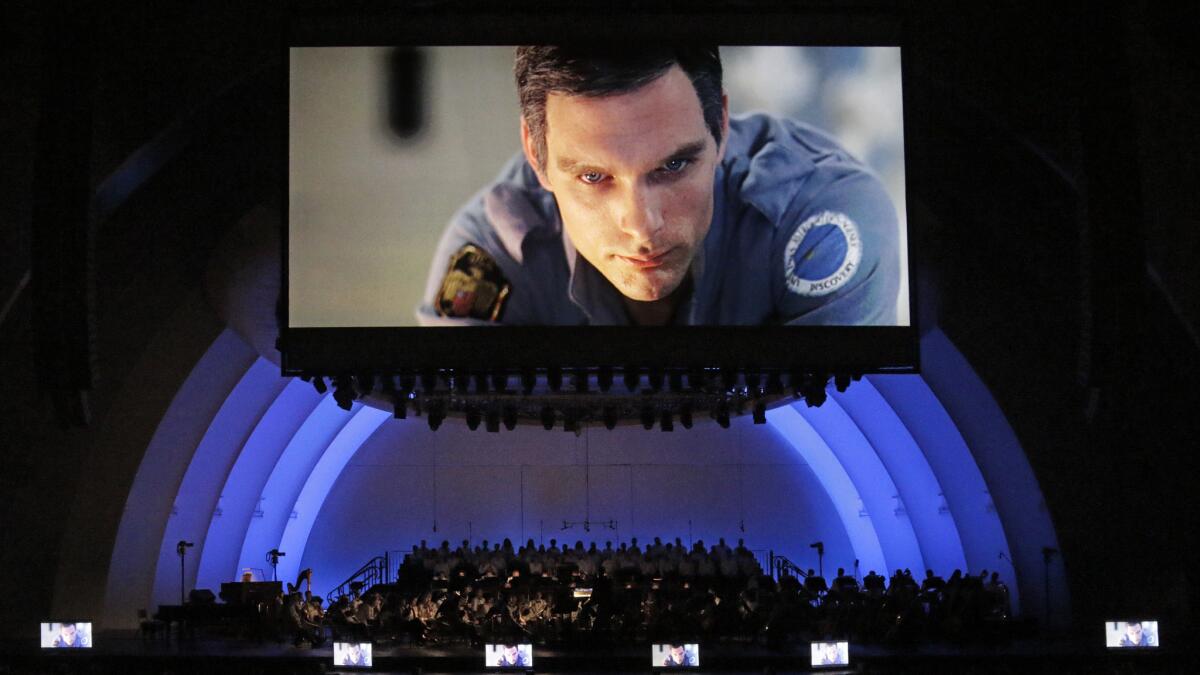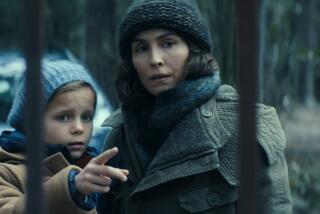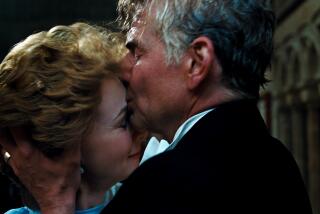Review: The stars, a ‘Space Odyssey’ and the Hollywood Bowl in cosmic harmony

The Hollywood Bowl makes an ideal venue for the L.A. Philharmonic to explore the classical music in Stanley Kubrick’s “2001.”
Stanley Kubrick’s 1968 film “2001: A Space Odyssey” became a landmark event for classical music almost by accident.
Kubrick had originally commissioned film composer Alex North to write an original score for his movie, but somewhere in the post-production phase, the maverick director decided that he liked the selections of classical music that he used as “guide tracks” better.
So North’s score was scrapped (it has since been found and released on CD), and the classical selections were embedded in pop culture. The MGM soundtrack album from the film went gold. The imposing “Sunrise” opening of “Also Sprach Zarathustra” suddenly became Richard Strauss’ most famous piece: Elvis Presley used it for his entrances at his concerts, and Eumir Deodato had a No. 2 hit record with a jazz-funk version.
SIGN UP for the free Essential Arts & Culture newsletter >>
“2001” (along with 1967’s “Elvira Madigan”) was a harbinger of a flurry of films in that era that used straight classical music, including “Slaughterhouse Five,” “Death in Venice” and Kubrick’s own “A Clockwork Orange.” Most unlikely of all, “2001” catapulted to fame the hitherto-little-known Hungarian avant-garde composer György Ligeti to his great surprise (and for awhile, chagrin), since he didn’t know his music was being used.
I would guess that had North’s score been retained, you would never encounter Ligeti’s spooky, drifting, challenging — and uncannily appropriate to the film — micropolyphony at Hollywood Bowl, where on Tuesday night the Los Angeles Philharmonic played the “2001” score live underneath a screening of the film.
There were live-orchestra screenings of “2001” in London in 2010 and Birmingham, England, in 2013; the San Francisco Symphony performed a “2001” program last September, albeit playing complete works without the film.
Yet all of these were done indoors, so seeing and hearing this sci-fi space-travel film under the stars added an extra dimension to the experience. It was easy to let go of any grappling with the film’s amorphous story line and just take the thing in as a spectacular, sensual, abstract light show.
With the Ligeti pieces most likely in mind, the phil turned to a new music person, Brad Lubman — whose Ensemble Signal participated in the Next On Grand concerts in May — to conduct. Lubman immediately made an impression, leading a powerful rendition of an excerpt from Ligeti’s “Atmospheres” prior to the film’s opening sequence. And one has to admit, the “Sunrise” opening has never sounded so thrilling as when heard by a live orchestra outdoors with the unforgettable corresponding images on the big screens, validating Kubrick’s original vision.
Yet the initial thrills soon threatened to spill into overkill, for the sound level was sometimes cranked up to the level of a rock concert. In the excerpts from Ligeti’s Requiem, Lubman led members of the Los Angeles Master Chorale with skill and fervor, but the voices sounded distorted at peak level, almost drowning out the instruments.
During the stunning “Star Gate” sequence, where the Requiem, “Atmospheres” and an electronic alteration of Ligeti’s “Aventures” follow in succession, the Bowl seemed to shake with unpleasantly deafening bass rumbling. Film audiences may be used to these sound levels, but it doesn’t do justice to this incredible music.
Fortunately, Johann Strauss Jr.’s “Blue Danube” Waltz wasn’t subjected to such sonic mayhem, and Lubman led it with considerable sway and grace, syncing with the footsteps of a flight attendant in the film. Same with the Adagio from Khachaturian’s “Gayane,” given a lovely, patient rendition, and Ligeti’s “Lux Aeterna.”
The turnout was huge for a Bowl weekday — not posted, but estimated at more than 11,000 by an usher — and a good deal of the audience behaved like a movie crowd, laughing and applauding at times, with many leaving en masse as the credits rolled while the philharmonic was still stoically playing the “Blue Danube” onstage. But get this: When the composer credits were flashed on screen, the one who got the biggest ovation was Ligeti. Kubrick’s trust in his audience was repaid.
More to Read
The biggest entertainment stories
Get our big stories about Hollywood, film, television, music, arts, culture and more right in your inbox as soon as they publish.
You may occasionally receive promotional content from the Los Angeles Times.






